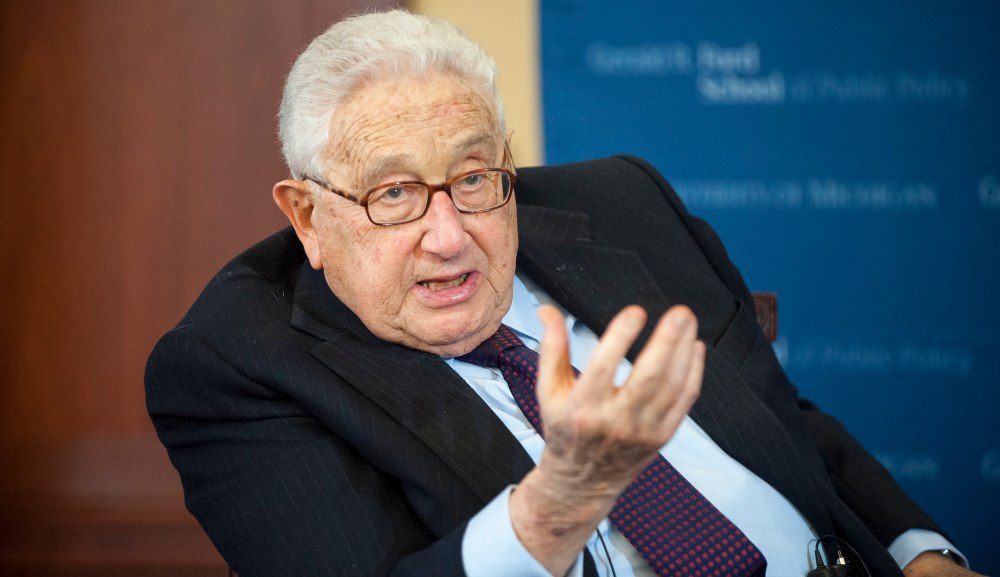
Who do Konrad Adenauer, Charles de Gaulle, Anwar Sadat, Richard Nixon, Lee Kwan Yue, and Margaret Thatcher have in common?
Henry Kissinger.
Now age 100, Dr. Kissinger has likely written his last book, topping out with an output of 27. George Simenon managed nearly 200 books before he wore out Inspector Maigret and his total output is estimated at 500. Writing mystery novels is one thing. Dr. Kissinger’s output is something else.

The book is Leadership: Six Studies in World Strategy. There is no person alive who has personally known as many major political leaders as Kissinger. The “studies” are essays from Kissinger’s perspective, arranged in roughly chronological order. Notes and references take up half of the 528 pages, and students/academics will find the annotations a trove of value for further study and debate.
General readers and history buffs are treated to the rarity of an author whose longevity and access to world leaders gives him personal perspectives available to few if any others. Some of the insights include:
“Leadership… requires the capacity to inspire and to sustain vision over time” (p. 44)
“One of the essential qualities of a statesman is the ability to resist being swept along by the mood of the moment” (p. 281)
“Leadership, for which a sense of history and the ability to deal with tragedy are indispensable” (p. 400)
“Two crucial questions confronting leaders: what is imperative for national security? And what is required for peaceful international coexistence?” (p. 409)
The author points out that most of his cast of characters was born into the beginnings (1914) of what he calls “the second 30 years’ war” that shaped much of their thinking through the end of the Second World War. They came to power at a time when the interrelationships of countries and governments went through changes that have shaped the 75 years after 1945.
Not surprisingly Kissinger is an admirer of Margaret Thatcher, who embodies many of his principles of strong, courageous leadership, often in the face of political and popular unpopularity. Notably, Thatcher is the only woman in these studies.
For instance, Charles De Gaulle was a prisoner of war in WW I who went on to reshape France twice at the end of the Second World War.
Konrad Adenauer born in 1876 bridged the interwar period as Mayor of Cologne, twice imprisoned by the Nazis, he then guided Germany to abandon the country’s efforts to dominate Europe. Instead, Adenauer mentored the rebuilding of Germany and the embryo of what was to become the European Union.
Richard Nixon is credited by Kissinger with moderating the tensions of the Cold War, getting the US out of Vietnam, and the opening to China.
Anwar Sadat rose from his early days as a revolutionary with Pan-Arabism hopes and dreams. The Egyptian defeat in the 1967 war with Israel gave Sadat the challenge of overcoming national humiliation to focus on regaining lost territory and to try to build peace with Israel.
Lee Kwan Yew was almost executed by the Japanese in WWII. He emerged to lead a small multi-ethnic city state that is a model of human and economic success.
As those examples show, one powerful theme in the book is overcoming adversity. All of his leaders have human weaknesses, but overcoming adversity, strength in the face of failure, and learning from criticism are among Kissinger’s pillars of leadership.
Discover more from Post Alley
Subscribe to get the latest posts sent to your email.

If I was reviewing a book by Henry Kissinger, I’d mention his war crimes in the first paragraph. This article doesn’t even hint at controversy. That’s disappointing, to say the least, but I expect Kissinger’s obituaries will be in the same oh-so-respectful tone.
Too right. Thank you.
Well, it’s a book by him, not a book about him. In terms of the summarized leader bios, the one that seems wrong to me is Nixon, who’s probably there to prove me wrong – that one is about Kissinger, not Nixon who generally did not exemplify “overcoming adversity, strength in the face of failure, and learning from criticism” – as everyone knows well enough that Kissinger could count on the reader to take the point.